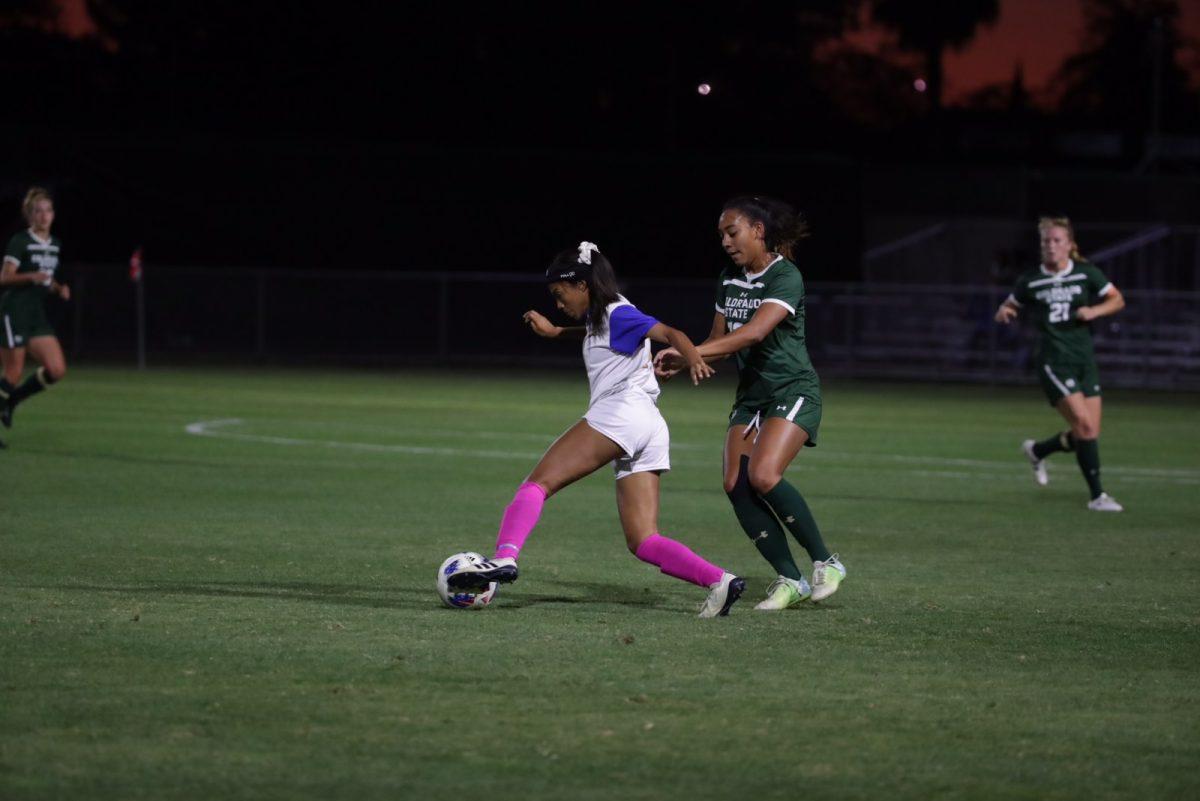
Former San Jose State women’s soccer player Hannah Hall said her time and experience playing a collegiate sport set her up for future success.
Over the course of several weeks, the trending Twitter hashtag #NotNCAAProperty has called for change in the National Collegiate Athletic Association’s treatment of student-athletes.
Several athletes competing in the NCAA men’s basketball March Madness tournament began protesting the organization’s restrictions on athletes using their own names, images and likeness for monetary use, according to a March 18 Washington Post article.
While the NCAA does offer many scholarships to student-athletes as a means of compensation, kinesiology senior and women’s soccer defender Lauola Amanoni explained this isn’t enough.
“I’ve heard ‘just because you’re on a scholarship you should be fine,’ but it’s not enough,” Amanoni said. “I have to plan financially just to be okay.”
She said during her junior year of college, she had to be a full-time athlete, student and work a part-time job to be economically stable.
Kinesiology freshman and swimming and diving athlete Alice Ciobanu said although she’s on scholarship, many of her athletic peers outside of San Jose State don’t have the same luxury.
She said she’s seen a majority of her peers outside of SJSU who aren’t on scholarships unable to work because of time-consuming practices which cause them to take out an excessive amount of loans.
“The world is changing, society is changing and prices are going up,” Ciobanu said. “I feel like especially if we are only confined to our sports and academics, we should get some compensation. Especially for those who are not on scholarships and have to pay for themselves.”
According to the NCAA website, the organization’s member-led mission is “dedicated to the well-being and lifelong success of college athletes.”
However, Ciobanu said being unable to accept brand deals and ambassador opportunities, especially when related to student-athletes’ majors, keeps them restricted only to their sports.
“If the NCAA could do anything, they should at least allow us to accept brand deals which would allow us to branch out and invest in our future,” Ciobanu said.
According to NCAA regulations, athletes aren’t eligible for college sports if they accept pay for promoting a product or service or if they allow their names or pictures to be used for a company’s promotion.
College basketball players Jordan Bohannon from the University of Iowa, Geo Baker of Rutgers University and Isaiah Livers from the University of Michigan have led the student-athlete protest. They called a meeting with state and federal lawmakers to enact change by July 1, according to a March 18 New York Times article.
The report mentioned in the article stated athletes’ main focus at the moment would be a follow-up on a vote that was delayed in the last days of former president Donald Trump’s administration. It would potentially loosen restrictions on athlete’s ability to monetize their fame.
The inability to monetize personal work is a nationwide struggle among student-athletes.
Ciobanu drew a connection to famous TikTok influencer Sedona Prince, a University of Oregon women’s basketball player who is unable to accept any of her earned money on the platform because of NCAA regulations. She said Prince’s creator fund would be worth a considerable amount of money given her account has 1.7 million followers.
Although many fans find the struggle among student-athletes disheartening, many players still pursue their athletic endeavors because of several benefits and passion for their sports.
Amanoni said despite the SJSU women’s soccer program not gaining as much revenue and publicity as sports with larger programs such as football, the community has tried its best to assist each other.
“As much as I would want to have the same benefits as football, we just don’t generate as much money,” Amanoni said. “However, the football program is very generous and they give us a lot of food and extras for our team, which I really appreciate.”
Communication studies junior and former SJSU women’s soccer player Hannah Hall said she’s appreciative of the experience she received.
Hall is a medically retired athlete but still remains on scholarship. Her goal is to work in the sports industry, so networking and building connections have always been a meaningful experience to her despite being a nonpaid athlete.
“I am a firm believer that hard work pays off,” Hall said. “In most jobs, you have to start from the bottom and rise your way up. Similar to an athlete who is on the bench wanting to get minutes on the field, you must work your way up.”
As the Michigan basketball players and other student-athletes across the NCAA continue to advocate for change, new developments regarding their rights could surface depending on the results of the current movement.